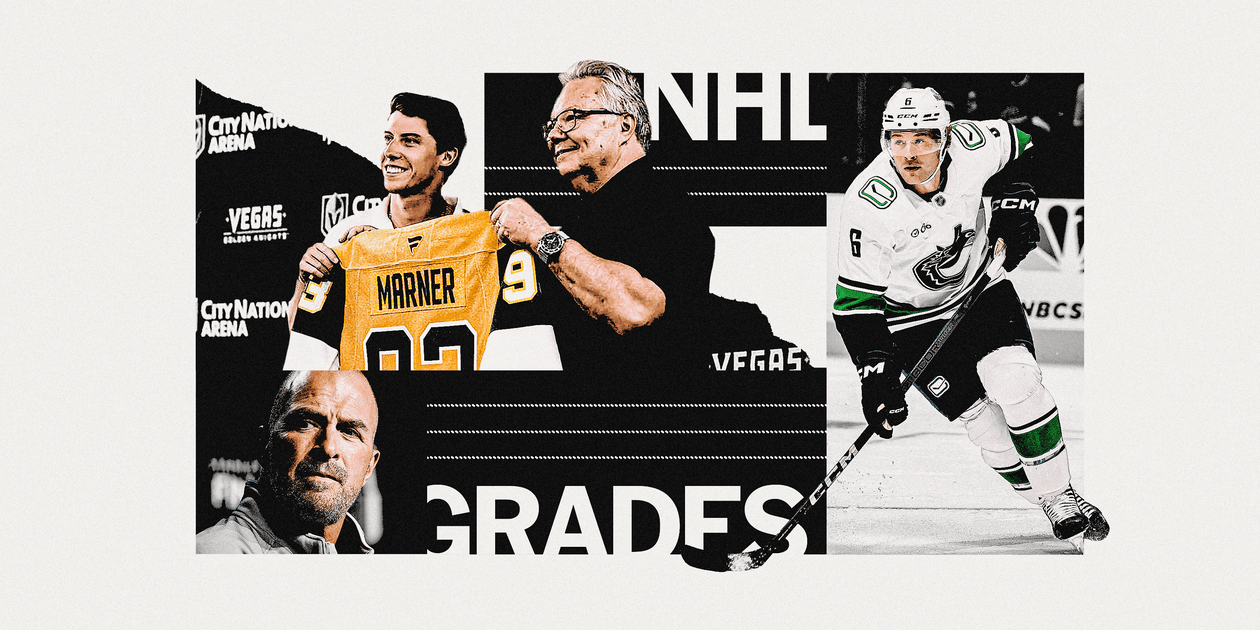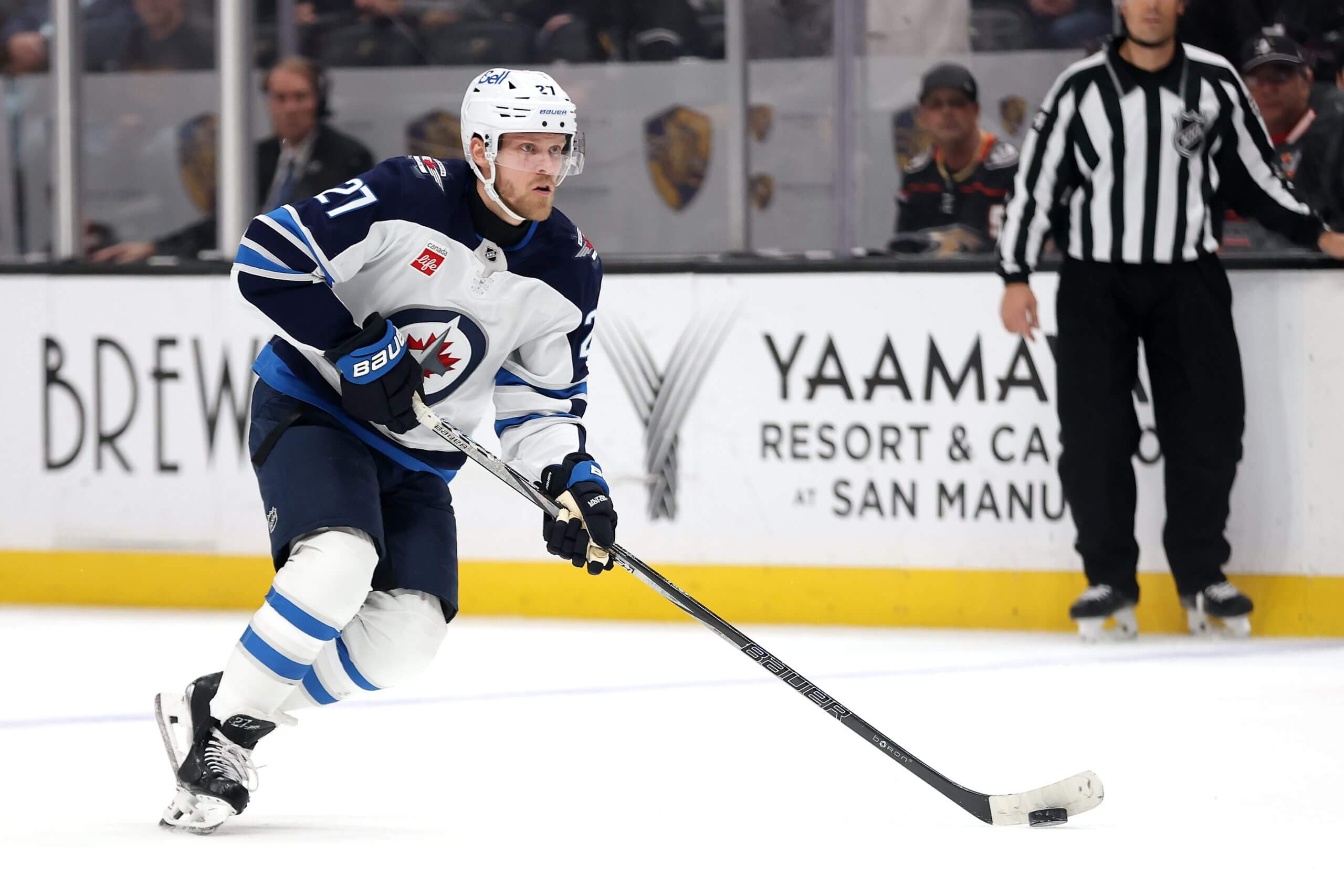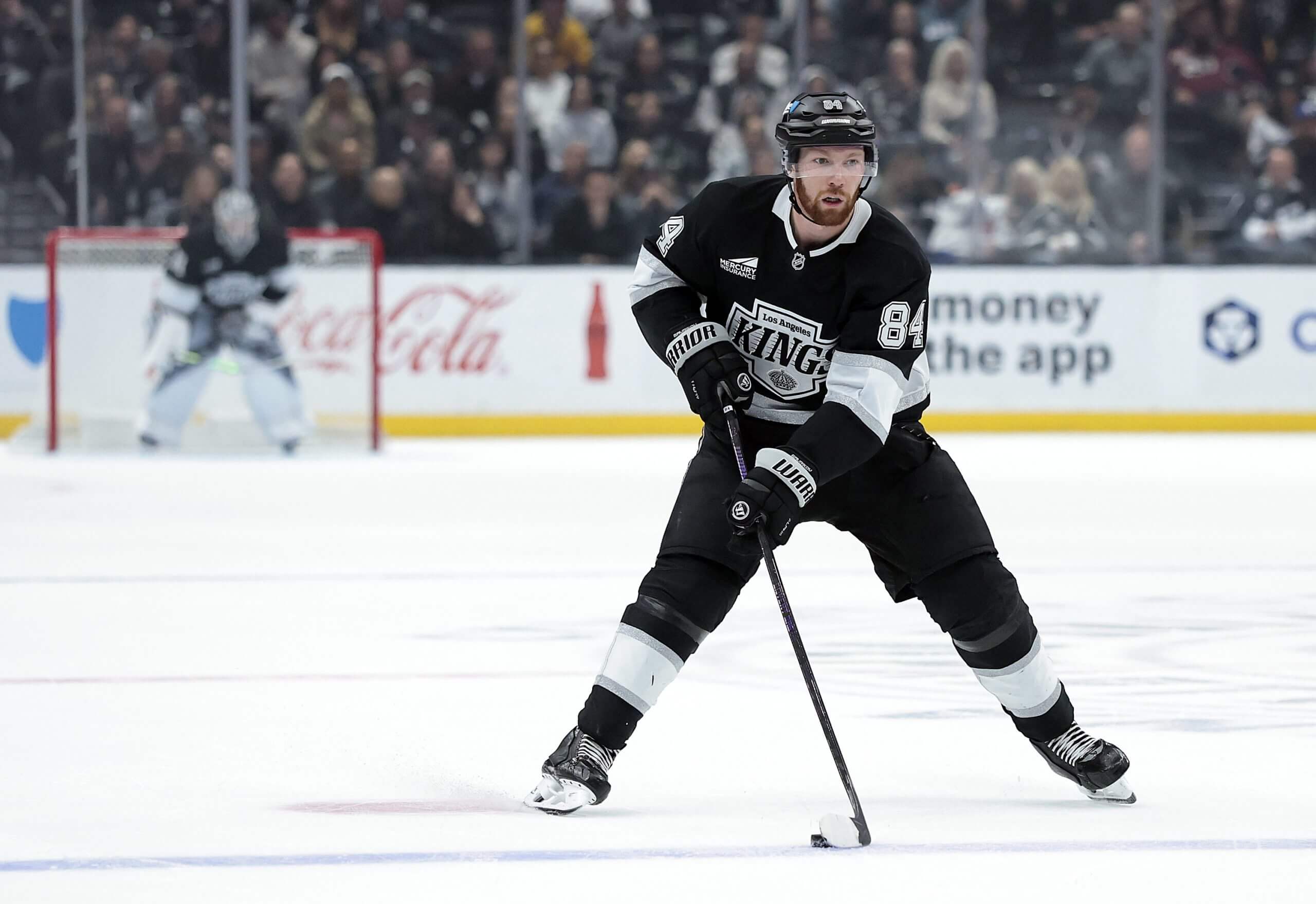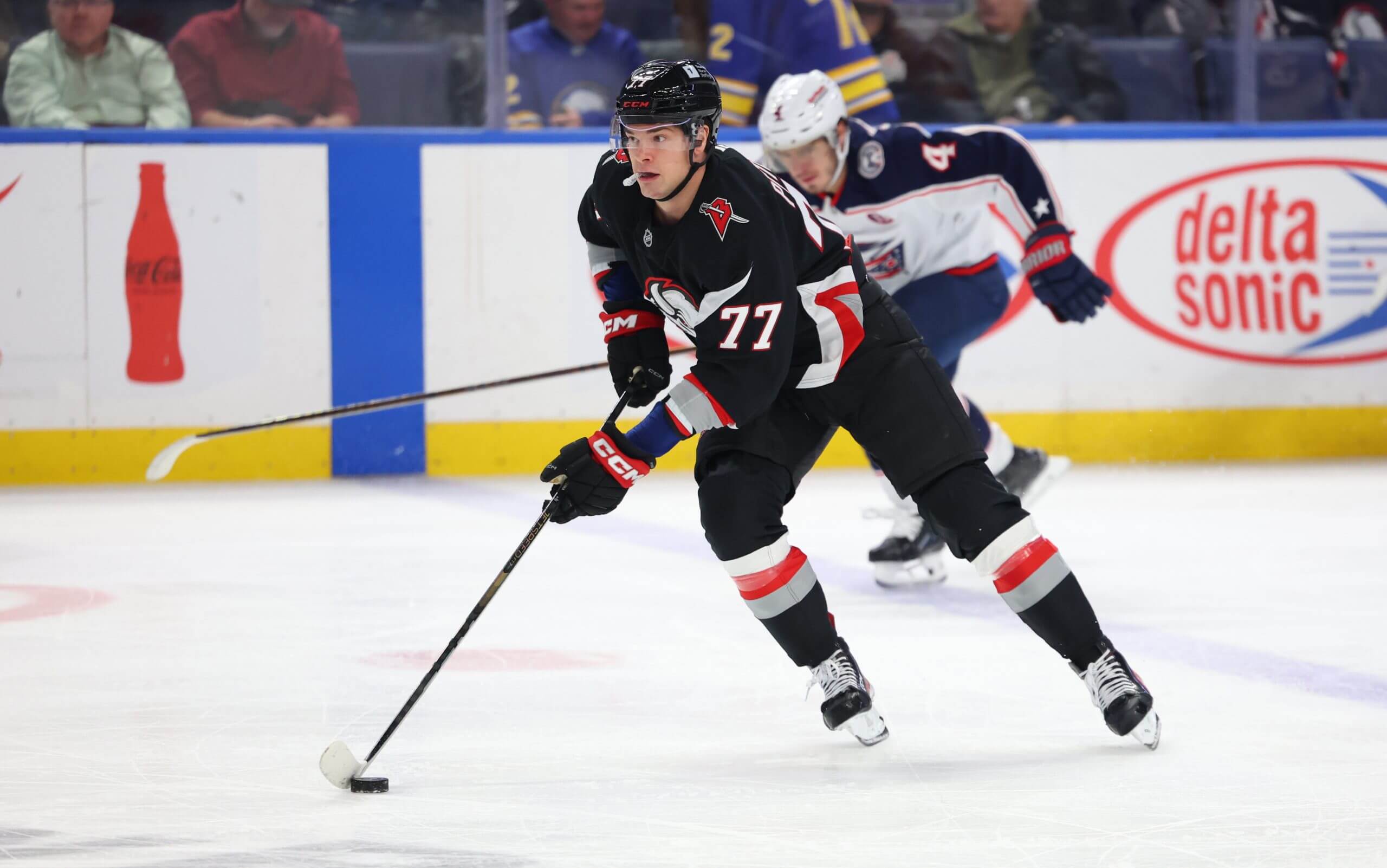Four days into NHL free agency, the list of impact players remaining on the market is … not lengthy.
Has your favorite team gotten the help it needed?
The Athletic asked its NHL staff this week for their assessments of the early moves. The analysis is subjective to each beat, not based on a scale, and factors in a team’s ability to make moves under the salary cap. Trades and re-signings since the season ended are also considered.
Here are the grades our writers assigned for the work done so far.
Anaheim Ducks: C+
All that salary cap space and the Ducks … still have all that cap space. Not that they had a prime shot at Mitch Marner — and it’s obvious that he had Vegas on his mind from when he was set to leave Toronto — but coming away with a 33-year-old Mikael Granlund has to be underwhelming given the possibilities. Granlund is a fine player and can help, but the next thing should be improving from within and re-signing RFAs Lukáš Dostál and Mason McTavish. — Eric Stephens
Boston Bruins: C-
There was a purpose behind their signings. Tanner Jeannot, Sean Kuraly, Mikey Eyssimont and Viktor Arvidsson are hard on pucks and opponents. The identity of the 2025-26 Bruins is clear. But there is a shortage of offensive skill. The Bruins did not improve their middle-six forwards. — Fluto Shinzawa
Buffalo Sabres: C+
The Sabres did well to fill two needs when they traded JJ Peterka to Utah for right-handed defenseman Michael Kesselring and winger Josh Doan. But replacing Peterka’s scoring won’t be easy. The depth additions of Justin Danforth, Alex Lyon and Conor Timmins were worthwhile additions, but there is still more work to do to bring this grade up. — Matthew Fairburn
Calgary Flames: C-
The Flames didn’t overspend again, which is good as they continue their rebuild/retool. But they still have Connor Zary left on their docket to re-sign. And the biggest question mark is what they’ll do with Rasmus Andersson. They are prepared to start the season with him on their roster, but they risk missing out on a window of opportunity if they don’t, considering the UFA class on defensemen. A C- is as good as we can do, because we can’t write “incomplete” just yet. — Julian McKenzie
Carolina Hurricanes: A-
The Hurricanes have swung big this offseason, orchestrating a sign-and-trade for defenseman K’Andre Miller and then landing one of the biggest free agents on the market by inking Nikolaj Ehlers to a six-year, $51 million deal. The moves bolster Carolina both up front and on the back end, though the Hurricanes must still figure out who is going to center their second line. Still, both of the team’s major moves have the potential to be home runs and solidify Carolina’s spot as a Cup contender. — Cory Lavalette
Chicago Blackhawks: D
What the Blackhawks did this offseason seems to make sense within the context of their long-term rebuild, but it’d be hard to say job well done and hand out a favorable grade for a team that ultimately did very little and is sitting on $20-plus million in cap space. Re-signing Ryan Donato was imperative and they accomplished that. André Burakovsky is intriguing if he can return to form. Overall, the lack of moves creates a path for the young players. — Scott Powers
Colorado Avalanche: B
Colorado didn’t do a ton in free agency, but that’s not necessarily a bad thing. The Avalanche signed Parker Kelly to a four-year extension while watching Jonathan Drouin and Ryan Lindgren walk on the open market. The biggest signing was adding veteran Brent Burns to the blue line. He’s 40, but with a base salary of only $1 million (according to Sportsnet’s Elliotte Friedman), he could be an incredible value. Burns’ offense has regressed over the last couple of years, but playing on a fast-skating transition team such as Colorado could revive it a bit. — Jesse Granger
Columbus Blue Jackets: D
The Blue Jackets had grand plans to transform their lineup on both ends of the ice, but their attempts to add a top-six scoring winger and a top-four right-side defender never materialized. To cut their losses, they circled back and signed their own blueliner, Ivan Provorov, to a massive seven-year, $59.5 million deal to keep him off the market. The Jackets added three bottom-six forwards in centers Charlie Coyle and Isac Lundestrom, and winger Miles Wood. But they take over for three veterans who were allowed to depart — Justin Danforth, Sean Kuraly and James van Riemsdyk. — Aaron Portzline
Dallas Stars: B
Dallas lost a couple of pieces, led by Mikael Granlund, but that was inevitable after adding Mikko Rantanen on a big ticket at the deadline. Jim Nill gets high marks for heavily discounted contracts for Matt Duchene and Jamie Benn, however, and basically balancing the cap books. There’s another million or so to shed, with Matt Dumba the likely casualty, but they have young defensemen coming such as Lian Bichsel and a bit of flexibility to make it work. The big question: How do they take a step forward with a similar cast that has stalled out in Round 3 the past three years? Perhaps another deadline swing? — James Mirtle
Detroit Red Wings: B-
It’s hard to quibble with anything the Red Wings did, and in adding John Gibson, James van Riemsdyk and Mason Appleton, they probably improved the overall roster. The middling grade, though, is because while those moves should help, they’re also not major needle-movers. In a weak market, that’s not totally unexpected, but for a team trying to snap a nine-year playoff drought, it’s also not particularly exciting. — Max Bultman
Edmonton Oilers: B-
The Oilers didn’t have much cap space after re-signing Trent Frederic and Evan Bouchard. They were sensible in their approach by bringing in speedy scoring option Andrew Mangiapane and the versatile Curtis Lazar, who could fill needs on the PK and as a right-handed faceoff guy. It’s hard to foresee those two players offsetting all the losses the Oilers incurred so far this offseason, and neither is a sure-fire top-six forward. — Daniel Nugent-Bowman
Florida Panthers: A+
How can you possibly criticize bringing back one of the most dominant teams in NHL history? No one thought when GM Bill Zito said he would be able to bring his big three UFAs back that it was possible, but he pulled it off in dramatic fashion in signing Sam Bennett, Aaron Ekblad and Brad Marchand in the four days before July 1. — James Mirtle
Los Angeles Kings: C-
I get it. Many have already given the Kings’ offseason an F and many more probably feel this meager grade is way too generous. Let a game or two be played first before concluding that Cody Ceci (or Ken Holland) and Brian Dumoulin (or Luc Robitaille) have permanently destroyed the franchise. The fourth line is instantly better, and Corey Perry is the net-front nuisance/occupant/finisher they need. But, no, they don’t have Mitch Marner or Bowen Byram. — Eric Stephens
Minnesota Wild: C+
The Wild had hoped to sign Brock Nelson in free agency, but he re-signed in Colorado. They wanted to sign Brock Boeser, but when it became clear he had other options, they pivoted to Vladimir Tarasenko on a one-year bet that his career can be reinvigorated. Nico Sturm should help their penalty-kill and faceoff needs, but this was not the July 1 “Christmas” fans expected after four years of buyout shackles limiting their every move. — Michael Russo
Montreal Canadiens: B
The Canadiens weren’t very active in free agency; they got their work done via trades (acquiring Noah Dobson and Zack Bolduc). Staying out of this free-agent market could be given a good grade on its own, but two sneaky signings addressed needed depth. Veteran goaltender Kaapo Kahkonen will serve as a mentor and tandem partner for top goalie prospect Jacob Fowler in the AHL, and Sammy Blais is the perfect extra forward/fourth-line energy guy/AHL veteran. The Canadiens didn’t sign anyone who moves the needle a whole lot, but they filled needs. Still, the loss of Christian Dvorak and Joel Armia left holes that were not filled. — Arpon Basu
Nashville Predators: C-
Nick Perbix is an effective signing of a much-needed right-shot defenseman at a good price, to lift the grade a bit. But trading for Nicolas Hague and giving him a deal well beyond reasonable expectation? Doing nothing to address the worst center group in the league? More size and physicality on defense were needed, but it’s far from enough. — Joe Rexrode
New Jersey Devils: B+
Tom Fitzgerald didn’t make any huge splashes, but he shored up the forward group in a way that should really help if the team can stay healthy. Bringing back Cody Glass made sense, and Evgenii Dadonov and Connor Brown will both bolster a forward group that lacked depth in the playoffs. — Peter Baugh
New York Islanders: B+
As much as the Noah Dobson trade can be rationalized, that ticks off some points from the Islanders’ grade. But otherwise, management gets credit for taking the team in a new direction. The team drafted well for a change, made some savvy short-term signings such as Jonathan Drouin and Maxim Shabanov, and extended players such as Adam Boqvist, Simon Holmstrom and Emil Heineman to cost-effective deals. — Shayna Goldman
New York Rangers: B+
The K’Andre Miller trade is risky, especially considering he’s going to a division rival, but the Rangers signed a strong player in Vladislav Gavrikov, took care of Will Cuylle’s second contract and added a depth winger in Taylor Raddysh. Plus, they did well on the Miller return, adding good draft capital and young defenseman Scott Morrow. — Peter Baugh
Ottawa Senators: C
The Senators weren’t expected to be big players in free agency. So their small moves, adding Lars Eller and re-signing Claude Giroux and Nick Cousins, aren’t too surprising. Trading for Jordan Spence could prove to be a solid move, too. Ottawa still could use another scorer on its top line, though. — Julian McKenzie
Philadelphia Flyers: B+
The Flyers acquired Trevor Zegras without having to give up much. They plugged a couple more holes in free agency, with depth center Christian Dvorak and goalie Dan Vladar. At the draft, they selected five players in the top 50, including potential top-line winger Porter Martone. While they still don’t have a No. 1 center (Zegras will get a shot at it, but there are no guarantees he’s the long-term solution), and Vladar’s career stats are pretty meh, Daniel Briere has managed to improve the current team while maintaining flexibility for the 2026 offseason. — Kevin Kurz
Pittsburgh Penguins: B
Kyle Dubas didn’t sign anyone to long-term money and he made a couple of sensible, cheap additions. Thus, he did fine. The Penguins aren’t in a place to be aggressive during this time of year. The real test will come when Dubas makes some trades this summer. And they are coming. — Josh Yohe
San Jose Sharks: B
At this time in their evolution, it might be hard to distinguish if the Sharks are more in the filling-out-the-roster stage than a building-it-back-up stage, but they’ve wisely made useful additions with their vast amount of cap space without taking on or handing out max-term contracts on middling players. That way, San Jose isn’t restricted for the future as it tries to build a team around future leader Macklin Celebrini. — Eric Stephens
Seattle Kraken: C
The Kraken weren’t able to use their cap space to land an impact game-breaking piece, which remains this club’s greatest need. But they did sign Ryan Lindgren to a four-year contract with a $4.5 million cap hit. Lindgren is only 27, but his black-and-blue style of defensive hockey has resulted in a steady flow of injuries and his five-on-five form fell off last season. Meanwhile, the club’s three RFAs — Kaapo Kakko, Tye Kartye and Ryker Evans — remain unsigned. Locking up Kakko and Evans long-term could improve this grade, but to this point, Seattle’s offseason hasn’t moved the needle. — Thomas Drance
St. Louis Blues: B+
The Blues tried to do everything imaginable. They went after Noah Dobson, but he wanted to play in the East. They entertained the idea of trading Jordan Kyrou but didn’t find a good enough deal. They added young right-shot defenseman Logan Mailloux in a trade for Zack Bolduc. They added reliable vets Pius Suter and Nick Bjugstad in free agency. They put Nick Leddy on waivers and removed his $4 million cap hit when he was picked up by San Jose. This grade would be an A if there wasn’t concern about Bolduc’s bright future, but you’ve got to give to get. — Jeremy Rutherford
Tampa Bay Lightning: B-
The Lightning made three low-key moves to round out the forward depth, including extending Yanni Gourde and signing Pontus Holmberg and Jakob Pelletier. Those kinds of contracts help balance the book around Tampa Bay’s core players. The Pelletier contract is the exact buy-low deal this team needs to find, considering its budget. But management didn’t sign a Nick Perbix replacement (or just a seventh defenseman). And the team hasn’t been able to land any needle-movers, either. Had management been able to move out some salary, maybe the Lightning could have done more. — Shayna Goldman
Toronto Maple Leafs: C
It’s difficult to fully grade even the early offseason because the Leafs have clearly gotten worse in the wake of Mitch Marner’s departure, with no major additions as of yet and the same look on defense. At this point, it’s Marner, Pontus Holmberg and Max Pacioretty (for now) out and Nicolas Roy, Matias Maccelli and Michael Pezzetta in. Roy and Maccelli both could be shrewd additions, but that’s still a significant downgrade in talent. The Leafs did well on the Matthew Knies and John Tavares contract extensions and a sharp trade for a top-six forward could push this grade higher. — Jonas Siegel
Utah Mammoth: A-
Acquiring JJ Peterka without giving up the No. 4 pick in the 2025 NHL Draft was a home run. He’s another dynamic young star to add to Utah’s impressive collection of rush-attacking forwards. The Mammoth did solid work filling out depth roles by signing Nate Schmidt, Brandon Tanev and Vitek Vanecek at reasonable prices. — Harman Dayal
Vancouver Canucks: C+
To this point in the offseason, the Canucks have yet to address their significant needs at center. They even lost a center-capable forward in unrestricted free agency when Pius Suter signed in St. Louis. That’s a gaping hole in the lineup, one the club will need to address over the rest of the summer or in-season. Vancouver paid a modest price for Evander Kane, which gives the team a different element in its top six. The Canucks also extended Conor Garland, Brock Boeser and Thatcher Demko, doubling down on their core. There is still work to be done in this lineup. — Thomas Drance
Vegas Golden Knights: A+
The Golden Knights’ biggest need this offseason was scoring on the wing, and they signed the third-highest scoring winger in the NHL since 2016. Mitch Marner gives Vegas an elite, play-driving winger to go with its already deep group of centers. Alex Pietrangelo announcing he’s out for the foreseeable future is troubling on the blue line, but there’s not a lot the team could’ve done on that front, so they earned the highest grade in free agency. — Jesse Granger
Washington Capitals: C-
The Capitals needed a third-line center and, if possible, some top-six skill. That hasn’t changed, though they made a run at Nikolaj Ehlers for the latter. Anthony Beauvillier is useful and Declan Chisholm adds quality depth on the blue line, but they’re not needle-movers. — Sean Gentille
Winnipeg Jets: B
The Jets landed Jonathan Toews, creating the potential for a homecoming story that resonates with fans for a long time. They added Gustav Nyquist, Tanner Pearson and Cole Koepke, too, and there isn’t an albatross contract among them: one-year term in all cases. Nikolaj Ehlers’ departure will hurt, while the new additions come with enough question marks to cause concern, such as whether Winnipeg will be slow this year. A special season from Toews would change everything. — Murat Ates
(Illustration: Demetrius Robinson / The Athletic; Photos: Chase Stevens / Las Vegas Review-Journal / Tribune News Service, Ezra Shaw, Steph Chambers / Getty Images)



